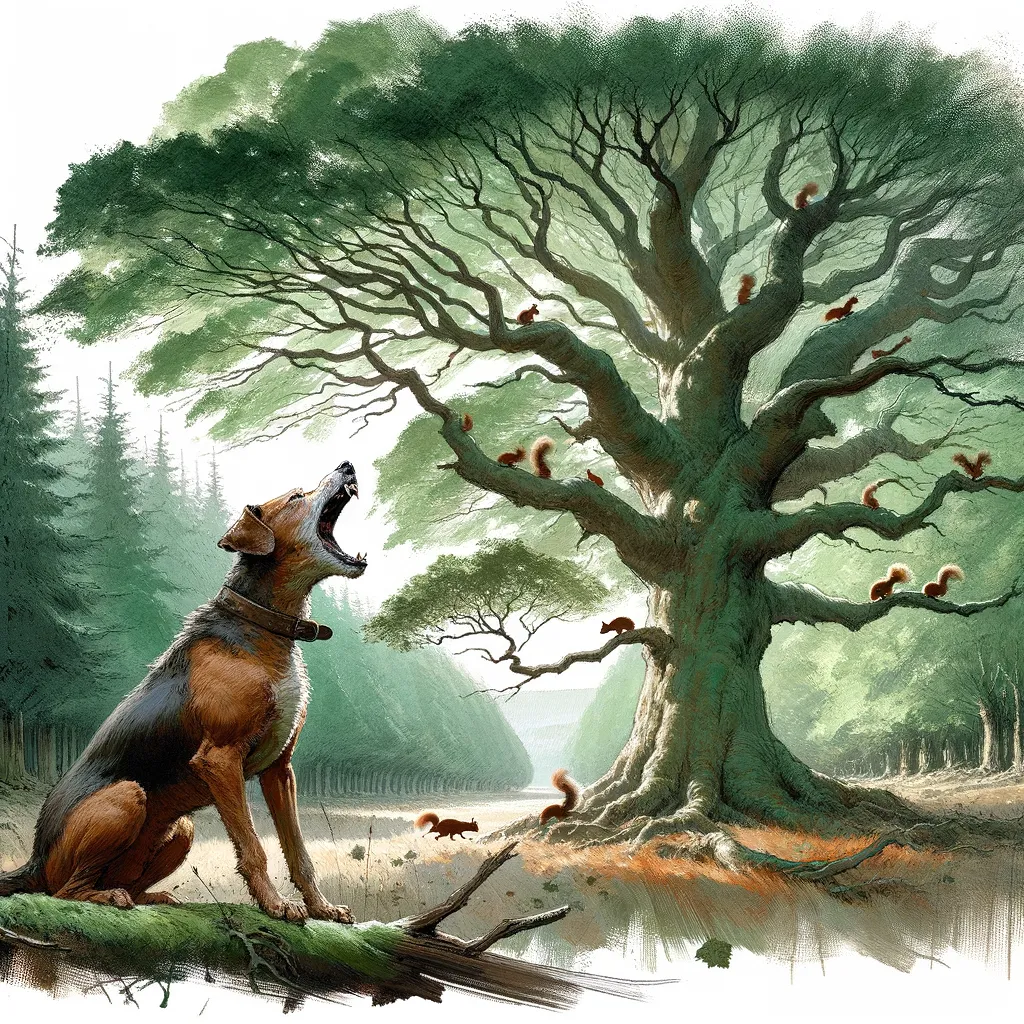Have you ever felt like you were putting a lot of effort into something, only to realize later that your approach was completely off? It's a feeling many of us know, that sense of trying to solve a problem or find something, but focusing on the wrong place or person. This common experience is captured perfectly by a well-known saying, one that brings to mind a very specific image.
When someone says you are "barking up the wrong tree," they mean you are pursuing a mistaken course of action. It suggests your efforts, while perhaps sincere, are misdirected, or you are making a false assumption about where to find what you seek. This idiom, you know, paints a vivid picture of a hunting dog, quite keen to please, but mistakenly baying at a tree where no prey hides.
This idea of misdirected energy is, in a way, quite universal. It applies to so many situations, from looking for a lost item in the wrong spot to accusing the wrong person of something. We will explore what this phrase truly means, where it came from, and how you can, perhaps, avoid this common pitfall in your own life. It's about getting your efforts pointed in the right direction, after all.
Table of Contents
- What "Barking Up The Wrong Tree" Truly Means
- Where Did This Saying Come From?
- Understanding Literal Barking: A Contrast
- Spotting When You're Barking Up The Wrong Tree
- Tips to Avoid Barking Up The Wrong Tree
- Frequently Asked Questions About This Idiom
What "Barking Up The Wrong Tree" Truly Means
The phrase "barking up the wrong tree" points to a situation where someone is, quite simply, mistaken in their efforts. It means you are, arguably, making a fundamental error in your approach to a problem or a search. Think of it like this: you are looking for a solution, but you are focusing your energy on something that has absolutely no connection to the answer you need. It's a very clear way to say, "Your efforts are not going to yield the results you want because you're looking in the wrong place."
This idiom often comes up when someone is making an accusation that is, apparently, incorrect. For instance, if you believe your neighbor took your mail, but it turns out the postal service simply delayed it, you were, in fact, barking up the wrong tree. Your focus was on the neighbor, but the actual issue lay elsewhere. It’s about misattribution, or perhaps, a flawed strategy, that is that.
It can also apply to problem-solving. Say you are trying to fix a computer issue, and you spend hours checking the software, only to discover the problem was a loose cable. You were, quite literally, barking up the wrong tree with your troubleshooting steps. The solution was physical, not digital, you know. Your energy, while well-intentioned, was just not aimed at the real source of the trouble. This applies to so many areas of life, from personal relationships to professional projects.
The core message is about wasted effort. If you are putting in time, thought, or resources into an area that cannot possibly give you the desired outcome, you are, essentially, barking up the wrong tree. It is a gentle, yet firm, way to suggest a change in direction. Sometimes, we get so focused on one idea, we miss the obvious alternative, or perhaps, the actual root of the matter. This idiom serves as a reminder to step back and re-evaluate our approach, you see.
Consider a situation where a business is struggling to attract new customers. If the marketing team spends all its budget on social media ads, but their target audience doesn't actually use those platforms, they are, in a way, barking up the wrong tree. Their efforts, though significant, are not reaching the right people. The strategy is misaligned with the reality of their customer base. It's about finding the right channel for the message, you know.
Where Did This Saying Come From?
The origin of "barking up the wrong tree" is, more or less, rooted in the American frontier. It's a phrase that, apparently, comes from hunting practices, specifically with dogs. When hunters used dogs to track game, like raccoons or bears, the dogs would sometimes chase the animal up a tree. The dog would then, naturally, bark at the base of that tree, signaling to the hunter where the prey was located. This was, in fact, a very useful signal.
However, sometimes a less experienced or perhaps, a very excitable dog would make a mistake. The animal might have, you know, jumped from one tree to another, or even climbed down and run off without the dog noticing. The dog would then continue to bark at the empty tree, convinced its quarry was still there. This is where the phrase gets its powerful imagery. The dog is putting in all this effort, making all this noise, but its target is long gone, or never even there.
The phrase gained popularity in the 19th century, especially in the United States. Early written uses of the phrase, for example, can be found in American literature and newspapers from that period. It quickly became a common way to describe any situation where someone was mistaken in their pursuit, much like that confused hunting dog. It’s a simple yet effective way to describe misdirected effort, that is that. This colorful background gives the idiom a grounded, relatable feel, connecting it to everyday experiences of trial and error.
The image of the dog barking at an empty tree is, basically, quite vivid. It helps us understand the futility of the action. The dog is doing what it knows how to do, but its focus is misplaced. This visual metaphor has, apparently, stood the test of time because it so accurately portrays the feeling of being off track. It's a reminder that even with good intentions, our actions can be ineffective if they are not aimed at the correct target, you know.
Understanding Literal Barking: A Contrast
It's interesting, in a way, to think about the literal act of barking when we discuss this idiom. My text, for instance, talks about how "Barking is a natural dog behavior." Dogs bark for many reasons, and this vocal communication is, you know, quite important for them. They bark to alert their owners, to express excitement, or even to signal a territorial warning. So, in the literal sense, barking is often a very direct and intentional form of communication.
The text also points out that "excessive barking is a nuisance." While barking itself is natural, if a dog barks too much, it can cause problems for people and neighbors. Learning to curb a dog's barking or understanding "why your dog is barking" is, apparently, a common concern for pet owners. This involves figuring out the root cause of the behavior, whether it's boredom, anxiety, or something else. It's about addressing the real reason for the noise,



Detail Author:
- Name : Ms. Jazmin Bosco
- Username : legros.gerda
- Email : raina07@treutel.info
- Birthdate : 1990-01-14
- Address : 130 Howell Underpass Suite 365 Cruickshankview, MA 82427-4674
- Phone : 516-223-8972
- Company : Homenick, Flatley and Padberg
- Job : Loan Counselor
- Bio : Quia quidem natus aspernatur facere. Provident doloribus nostrum est itaque libero qui quam provident.
Socials
instagram:
- url : https://instagram.com/rosie_xx
- username : rosie_xx
- bio : At eligendi aut illo vero. Eos facere sint aliquam dolores omnis. Sint dolor quia ipsa deserunt.
- followers : 6299
- following : 2296
facebook:
- url : https://facebook.com/rosie.kuhn
- username : rosie.kuhn
- bio : Nulla debitis exercitationem dolorum quidem distinctio omnis voluptate eius.
- followers : 5839
- following : 2522
linkedin:
- url : https://linkedin.com/in/rkuhn
- username : rkuhn
- bio : In magni non doloremque libero illum sit et.
- followers : 153
- following : 2984

